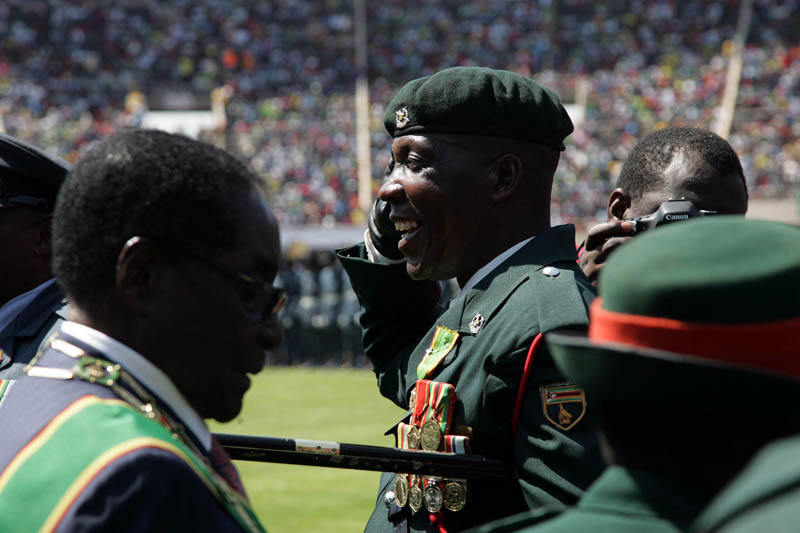
PRESIDENT Robert Mugabe yesterday swatted calls for security sector realignment, which were central to the MDCs’ call for reform, saying the military had been a reliable pillar of the government.
STAFF REPORTER
Mugabe also said he saw his July 31 election as a mandate for “total” application of policies forcing foreign-owned firms to sell majority stakes to local investors.
Addressing Defence Forces Day commemorations in Harare, Mugabe said he was surprised by the inclusive government partners’ calls for security sector reform, saying this was disregard for the good work the military had done in maintaining peace.
He said it was “surprising that some misguided fellow countrymen, at the behest of their Western allies, blatantly disregard the good work done by the Zimbabwe Defence Forces in maintaining peace and tranquillity in the country”.
“They disguise this by demanding what they call security sector reform, when it is obvious the enemy’s real ploy is to dilute the efficiency of the Zimbabwe Defence Forces,” he told the crowd.
Ahead of last month’s poll, the two MDC parties accused the security sector of being partisan saying it needed to be reformed, a proposal that Mugabe and his Zanu PF party flatly rejected.
In the past, some senior army officials have made disparaging remarks about Mugabe’s rival, Prime Minister Morgan Tsvangirai, with some saying they would not salute him if he won elections.
- Chamisa under fire over US$120K donation
- Mavhunga puts DeMbare into Chibuku quarterfinals
- Pension funds bet on Cabora Bassa oilfields
- Councils defy govt fire tender directive
Keep Reading
Mugabe maintained a belligerent defence of his re-election on July 31, which is being challenged in court as fraudulent by Tsvangirai, saying the massive 61% poll win had given Zanu PF a mandate to implement its policies, chief among them being the indigenisation policy.
Rejecting this challenge along with questions by Western governments about the election’s credibility, Mugabe said his new five-year term extending his 33 years in power gave him the chance to enact what he called the “last chapter” of a fiercely nationalist economic strategy.
His indigenisation policy seeks to redistribute wealth by forcing foreign-owned firms to sell at least 51% to black Zimbabweans.
“Now that the people of Zimbabwe have granted us a resounding mandate in the governance of the country, we will do everything in our power to ensure that our objective of total indigenisation, empowerment, development and employment is realised,” he said.
“This is our final phase of implementing the ideals of the liberation struggle.”
The President vowed to see through the indigenisation policy, saying he wanted to ensure that Zimbabweans enjoyed the country’s resources.
“The indigenisation and empowerment drive will continue unabated in order to ensure that indigenous Zimbabweans enjoy a larger share of the country’s resources,” he said.
As Mugabe soldiers ahead with his black empowerment policies, critics fear that this will only benefit his inner circle, while the rest of the country will not see any tangible benefits.
Yesterday, the Defence Forces Day commemorations resembled a Zanu PF victory party as supporters, clad in their green and yellow party regalia and armed with anti-MDC-T banners, filled the stadium.
Some of the banners read: “Learn to lose with dignity; Gladly get rid of the 3-legged monster (the inclusive government); July 31 the day we buried imperialism; Let’s tackle water and electricity challenges now that the thieves (MDCs) are gone; Now begins the empowerment revolution and Rakapinda mugedhi zvisina tsvete (We scored without favouritism)”.
Mugabe said this year’s Defence Forces Day commemorations resonated with his victory.
“The theme is more relevant to the country as we travel the crucial path of consolidating the gains of our hard-won independence through the total economic emancipation of our people under the motto: ‘Indigenise, Empower, Develop and Employ’,” he said.
He pledged to improve the uniformed forces’ conditions of service.
“Conditions of service for the Zimbabwe Defence Forces, like those of other civil servants, have remained below expectations, considering that their salaries and allowances fall below the poverty datum line. Over the past 10 years, the fact that the government has been battling illegal sanctions from the West has resulted in inadequate budgetary allocations to the Ministry of Defence and the entire Defence Forces establishments,” Mugabe said.
He also cited lack of resources for the country’s failure to meet a 2009 deadline set by the Ottawa Convention on Anti-Personnel Landmines for the clearance of the deadly devices which are believed to be buried at most of the country’s borders.
Zimbabwe became a signatory to the convention in 1999 and was given 10 years to clear the landmines, planted by colonial forces during the war of liberation.







